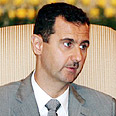
Assad: Iran won't attack Israel with nukes
In leaked document, Syrian president cautions US senators against linking Islamic Republic's nuclear program to Israeli-Syrian peace deal, says Iranian nuclear strike would result in massive Palestinian casualties, which Tehran would never risk
In a telegram sent to Washington from the US Embassy in Damascus, following a meeting between Assad and American Senator Benjamin Cardin on February 18 2009, the Syrian president is quoted as saying, "We're not convinced Iran is developing nuclear weapons."
He added that Iran could not use a nuclear weapon as a deterrent because nobody believed Iran would actually use it against Israel. Assad noted that an Iranian nuclear strike against Israel would result in massive Palestinian casualties, which Tehran would never risk.
He maintained that International Atomic Energy Agency monitoring would ensure Iran's pursuit of nuclear power for civilian purposes only.
'Military superiority won't help'
In another meeting with American senators, held on December 30, 2009, Assad likened the peace process with Israel to how a doctor should treat cancer. "Condemnations and mutual recriminations might be self-satisfying, but the cancer still grows unless the doctor is able to treat the root illness," he argued.
The Turkey-brokered indirect peace talks with Israel in 2008 were efficient, the Syrian president said. "In roughly eight months, these talks had achieved more than several years of direct negotiations with Israel in the 1990s."
According to Assad, the Americans must support the Turkish track and convince Israel that only peace will protect it. "Israel's military superiority won't secure it from an attack against missiles and other technologies," he told the senators.
One of the senators asked why Syria insisted on pursuing indirect peace talks via the Turks. "Why can't Syria and Israel move to direct talks brokered by the US, while Syria helps on issues important to the US, such as Hezbollah, Hamas, and relations with Iran?"
Assad replied that Hamas and Hezbollah should be a part of the peace, but not organizing principles for conducting peace discussions.
'Elephant in the room'
The documents also reveal the Syrian presidents opinion on Hamas. During the meeting with the American senators, Assad referred to the Palestinian organization as "an uninvited guest". He said Hamas originated in the Muslim Brotherhood movement Syria had combated in the 1980s.
"If you want me to be effective and active, I have to have a relationship with all parties. Hamas is Muslim Brotherhood, but we have to deal with the reality of their presence."
Regarding the disarmament of Hezbollah, Assad argued that the Shiite group "has no specific interest in Israel besides securing Lebanon's borders and preventing threats to
Lebanon's integrity, like Israel's daily violations of Lebanese airspace."
He noted that Hezbollah was the most powerful political party in Lebanon, was democratically elected, and if peace in the region were to be achieved, "the small things" with Hezbollah and Hamas would disappear. "Let's talk about the peace. This is the big picture that will solve everything."
According to the report, the American guests could not ignore the "elephant in the room," asking whether it would be possible to reach peace with Israel without first resolving the Iranian nuclear issue.
Assad cautioned against linking Iran's nuclear program to an Israeli-Syrian peace deal, arguing that such a link would only complicate both sets of issues. "Too many cooks spoil the meal," he said.
The Syrian president said he believed Iran was not interested in pursuing a nuclear weapon, but warned that an Israeli military strike on the Islamic Republic's nuclear infrastructure would fail to disable the program and would only increase Iran's determination.
Roi Mandel contributed to this report
- Follow Ynetnews on Facebook










